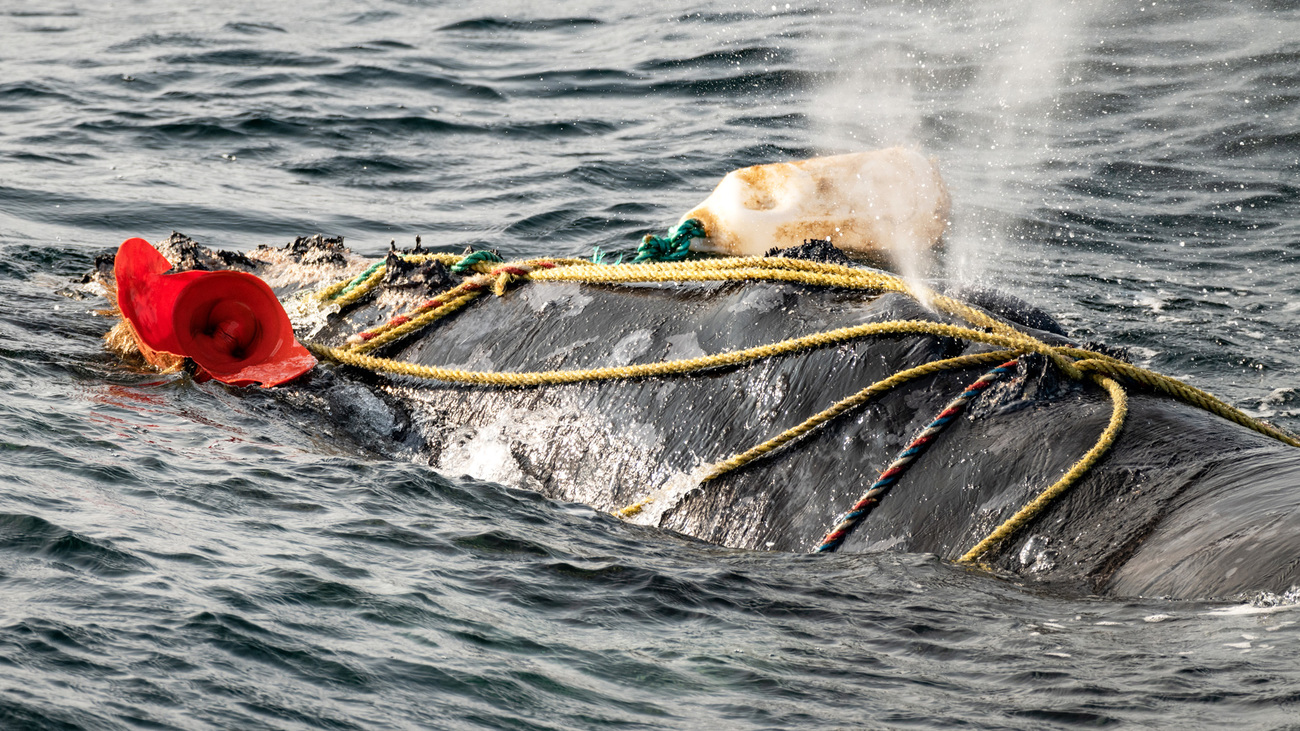Saving the North Atlantic right whale - North America
Don't fail our whaleEU-US lobster deal threatens North Atlantic right whales
EU-US lobster deal threatens North Atlantic right whales

Brussels, 27 November 2020 – The European Commission is about to incentivise one of the main threats to the critically endangered North Atlantic right whale, by eliminating taxes on the import of lobster from the east coast of the US. Entanglements in vertical lines connecting buoys to lobster traps on the ocean floor in east coast fisheries are the leading cause of death and pushing this whale population to the brink of extinction.
With yesterday’s vote, the European Parliament plenary approved lifting the 8 percent tax on imports of US lobsters in accordance with a mini-deal agreed with the US in August. Fifteen percent of all lobster imports into the EU last year came from the US, according to the EU Commission.
“North Atlantic right whales are on the brink of extinction” said Eleonora Panella, Senior EU Campaigner at IFAW, the International Fund for Animal Welfare. “By including lobsters in this mini-deal, the Commission is ignoring the huge environmental impact of current lobster fishing practices on this critically endangered species and undermining its pledge to save biodiversity. It is shocking that the European Parliament would even consider ratifying a tariff removal from an unsustainable US fishery export. The deal has the green light by the European Council, but still needs to be formally approved, it is disappointing that Member States did not choose help save endangered right whales”.
Also in August, and in light of the substantial entanglement risk posed from vertical buoy lines used in the lobster fishery on the North Atlantic right whale population, the Marine Stewardship Council (MSC) suspended its ‘sustainable’ certification of lobster from the Gulf of Maine. The impact that the European trade of US lobster is having on this critically endangered species has been brought before European Commission previously. In 2019, former MEP Catherine Bearder pointed out the negative impacts of lobster fisheries on the North Atlantic right whale population in a question to Commissioner Sinkevičius.
Much of the critical feeding grounds of last remaining estimated 360 whales of this species overlap with areas of intense lobster fishing in the US. An array of lobster traps are connected with vertical lines to buoys on the water’s surface. Millions of these vertical lines are present in the water column throughout right whale habitat. Whales swimming through these waters frequently become entangled in these lines, dragging the lobster gear behind them, which leads to severe injuries and often an eventual, cruel death.
“Scientists examining North Atlantic right whale scars estimate that 85 percent of the remaining whales have been entangled in fishing gear at least once, 60 percent have even been entangled multiple times. We can help in Europe by only buying sustainably caught lobster. That is possible, and IFAW is supporting the development of ropeless fishing gear without these dangerous vertical lines”, continues Panella. “The EU should not go ahead with such a deal if it contradicts its own Biodiversity Strategy.”
Since 2018, IFAW has been working with the fishing industry to support the development of ‘ropeless’ fishing gear technology in an effort to remove dangerous vertical buoy lines from the water column and drastically reduce whale entanglements.
Press Contact:
Benjamin Wiacek, Communications Manager
m: +32 492 17 15 81 or e: bwiacek@ifaw.org
About The International Fund for Animal Welfare (IFAW):
The International Fund for Animal Welfare (IFAW) is a global non-profit helping animals and people thrive together. We are experts and everyday people, working across seas, oceans, and in more than 40 countries around the world. We rescue, rehabilitate, and release animals, and we restore and protect their natural habitats. The problems we’re up against are urgent and complicated. To solve them, we match fresh thinking with bold action. We partner with local communities, governments, non-governmental organisations, and businesses. Together, we pioneer new and innovative ways to help all species flourish. See how at ifaw.org.
Related content
Our work can’t get done without you. Please give what you can to help animals thrive.